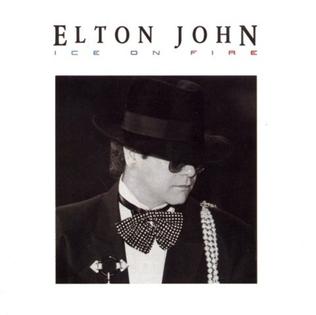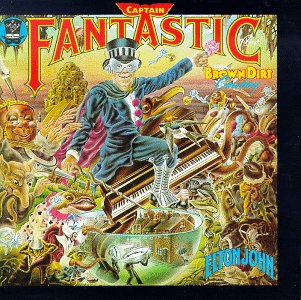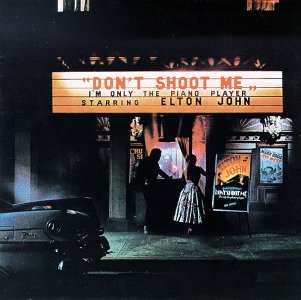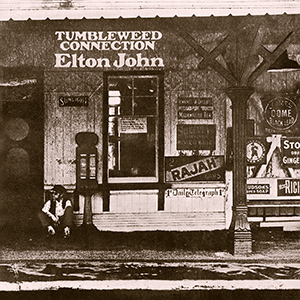best Elton John songs (A-Z) ↓↓↓

Scroll down and discover the best Elton John songs (A-Z)!
We've meticulously organized our extensive library for your convenience. Explore best Elton John songs sorted by popularity to easily find the tracks that resonate most with listeners, or browse through our alphabetical (A-Z) listing to discover hidden gems and classic favorites alike. Whether you’re a long-time fan or new to Elton John music, there’s something for everyone to enjoy.
♫Elton John
Best Elton John songs
- 1 Don’t Go Breaking My Heart
- 2 Rocket Man
- 3 Nikita
- 4 Candle In The Wind
- 5 Candle In The Wind 1997
- 6 Sacrifice
- 7 Your Song
- 8 A Simple Man
- 9 Crocodile Rock
- 10 Daniel
- 11 Can You Feel The Love Tonight
- 12 Blue Eyes
- 13 Funeral For A Friend
- 14 Goodbye Yellow Brick Road
- 15 Lucy In The Sky With Diamonds
- 16 Circle Of Life
- 17 Song For You
- 18 Don’t Let The Sun Go Down On Me
- 19 A Dandelion Dies In The Wind
- 20 Goodbye
- 21 I Believe
- 22 (gotta Get A) Meal Ticket
- 23 I Saw Her Standing There
- 24 Believe
- 25 Emily
- 26 A Woman’s Needs
- 27 Baby I Miss You
- 28 All The Girls Love Alice
- 29 Tiny Dancer
- 30 The One
A-Z songs of Elton John (346)
- ♫ (gotta Get A) Meal Ticket
- ♫ (i Just Wanna) B With U
- ♫ A Dandelion Dies In The Wind
- ♫ A Simple Man
- ♫ A Step Too Far
- ♫ A Woman’s Needs
- ♫ A Womans Needs
- ♫ A Word In Spanish
- ♫ Abide With Me
- ♫ Act Of War
- ♫ Ain’t Nothing Like The Real Thing
- ♫ All Across The Havens
- ♫ All Quiet On The Western Front
- ♫ All That I’m Allowed
- ♫ All The Girls Love Alice
- ♫ All The Nasties
- ♫ Amazes Me
- ♫ American Triangle
- ♫ Amneris’ Letter
- ♫ Amoreena
- ♫ Amy
- ♫ Angel Tree
- ♫ Annabella Umberella
- ♫ Another Pyramid
- ♫ Answer In The Sky
- ♫ Are You Ready For Love
- ♫ Baby I Miss You
- ♫ Bad Side Of The Moon
- ♫ Ball And Chain
- ♫ Ballad Of A Well Known Gun
- ♫ Ballad Of A Well—known Gun
- ♫ Belfast
- ♫ Believe
- ♫ Bennie And The Jets
- ♫ Better Off Dead
- ♫ Between Seventeen And Twenty
- ♫ Bid Dipper
- ♫ Big Dipper
- ♫ Big Man In A Little Suit
- ♫ Billy And The Kids
- ♫ Billy Bones And The White Bird
- ♫ Bite Your Lip (get Up And Dance)
- ♫ Bitter Fingers
- ♫ Blessed
- ♫ Blue Avenue
- ♫ Blue Eyes
- ♫ Blues For Baby And Me
- ♫ Blues For My Baby And Me
- ♫ Boogie Pilgrim
- ♫ Border Song
- ♫ Born Bad
- ♫ Born To Lose
- ♫ Breaking Down Barriers
- ♫ Breaking Hearts (ain’t What It Used To Be)
- ♫ Burn Down The Mission
- ♫ Burning Buildings
- ♫ But Not For Me
- ♫ Cage The Song Bird
- ♫ Cage The Songbird
- ♫ Can I Put You On
- ♫ Can You Feel The Love Tonight
- ♫ Can You Feel The Love Tonight?
- ♫ Can’t Get Over Getting Over Losing You
- ♫ Can’t Keep This From You
- ♫ Candle In The Wind
- ♫ Candle In The Wind 1997
- ♫ Candy By The Pound
- ♫ Captain Fantastic And The Brown Dirt Cowboy
- ♫ Cartier
- ♫ Chameleon
- ♫ Chapel Of Love
- ♫ Chasing The Crown
- ♫ Chloe
- ♫ Circle Of Life
- ♫ Club At The End Of The Street
- ♫ Cold
- ♫ Cold As Christmas (in The Middle Of The Year)
- ♫ Cold Highway
- ♫ Come And Get It
- ♫ Come Back Baby
- ♫ Come Down In Time
- ♫ Conquer The Sun
- ♫ Cottonfields
- ♫ Country Comfort
- ♫ Country Love Song
- ♫ Crazy Water
- ♫ Crocodile Rock
- ♫ Cry To Heaven
- ♫ Crystal
- ♫ Curtains
- ♫ Dan Dare (pilot Of The Future)
- ♫ Dancing In The End Zone
- ♫ Daniel
- ♫ Dark Diamond
- ♫ Day Is Done
- ♫ Dear God
- ♫ Dear John
- ♫ Did He Shoot Her
- ♫ Dirty Little Girl
- ♫ Dixie Lily
- ♫ Don’t Go Breaking My Heart
- ♫ Don’t Let The Sun Go Down On Me
- ♫ Don’t Stop
- ♫ Don’t Trust That Woman
- ♫ Donner Pour Donner
- ♫ Dreamboat
- ♫ Ducktail Jiver
- ♫ Duets For One
- ♫ Durban Deep
- ♫ Easier To Walk Away
- ♫ Easy As Life
- ♫ Ego
- ♫ El Dorado
- ♫ Elaborate Lives
- ♫ Elderberry Wine
- ♫ Elton’s Song
- ♫ Emerald
- ♫ Emily
- ♫ Empty Garden
- ♫ Empty Garden (hey Hey Johnny)
- ♫ Empty Sky
- ♫ Enchantment Passing Through
- ♫ Fascist Faces
- ♫ Feed Me
- ♫ First Episode At Hienton
- ♫ Freaks In Love
- ♫ Friends
- ♫ Friends Never Say Goodbye
- ♫ Funeral For A Friend
- ♫ Georgia
- ♫ Give Me The Love
- ♫ Go On And On
- ♫ Goodbye
- ♫ Goodbye Marlon Brando
- ♫ Goodbye Yellow Brick Road
- ♫ Gotta Get A Meal Ticket
- ♫ Grey Seal
- ♫ Grimsby
- ♫ Grow Some Funk Of Your Own
- ♫ Gulliver
- ♫ Hard Luck Story
- ♫ Harmony
- ♫ Have Mercy On The Criminal
- ♫ Healing Hands
- ♫ Heart In The Right Place
- ♫ Hercules
- ♫ High Flying Bird
- ♫ Holiday Inn
- ♫ Honky Cat
- ♫ Hymn 2000
- ♫ I Am Your Robot
- ♫ I Believe
- ♫ I Cry At Night
- ♫ I Don’t Care
- ♫ I Don’t Wanna Go On With You Like That
- ♫ I Feel Like A Bullet (in The Gun Of Robert Ford)
- ♫ I Guess That’s Why They Call It The Blues
- ♫ I Just Can’t Wait To Be King
- ♫ I Need You To Turn To
- ♫ I Saw Her Standing There
- ♫ I Stop And I Breathe
- ♫ I Swear I Heard The Night Talking
- ♫ I Think About You
- ♫ I Think I’m Going To Kill Myself
- ♫ I Want Love
- ♫ I’m Going To Be A Teenage Idol
- ♫ I’m Still Standing
- ♫ I’m Your Man
- ♫ I’m Your Puppet
- ♫ I’ve Been Loving You
- ♫ I’ve Seen That Movie Too
- ♫ I’ve Seen The Saucers
- ♫ Idol
- ♫ If The River Can Bend
- ♫ If There’s A God In Heaven
- ♫ If There’s A God In Heaven (what’s He Waiting For)
- ♫ If You Were Me
- ♫ Indian Sunset
- ♫ Island Girl
- ♫ It Ain’t Gonna Be Easy
- ♫ It’s Getting Dark In Here
- ♫ It’s Tough To Be A God
- ♫ Jack Rabbit
- ♫ Jamaica Jerk Off
- ♫ Je Veux De La Tendresse
- ♫ Johnny B. Goode
- ♫ Just Like Belgium
- ♫ Just Like Strange Rain
- ♫ Lady What’s Tomorrow
- ♫ Levon
- ♫ Little Jeannie
- ♫ Live Like Horses
- ♫ Love Adventure
- ♫ Love Her Like Me
- ♫ Love Is A Cannibal
- ♫ Love Is Here To Stay
- ♫ Love Letters
- ♫ Love Lies Bleeding
- ♫ Love Of The Common People
- ♫ Love So Cold
- ♫ Love Song
- ♫ Lovesick
- ♫ Lucy In The Sky With Diamonds
- ♫ Made For Me
- ♫ Made In England
- ♫ Madman Across The Water
- ♫ Madness
- ♫ Mama Can’t Buy You Love
- ♫ Medley (yell Help, Wednesday Night, Ugly)
- ♫ Mellow
- ♫ Midnight Creeper
- ♫ Mona Lisa And Mad Hatters
- ♫ Mona Lisas And Mad Hatters
- ♫ Mona Lisas And Mad Hatters Part Two
- ♫ My Baby Loves Lovin’
- ♫ My Elusive Drug
- ♫ My Fathers Gun
- ♫ Never Gonna Fall In Love Again
- ♫ Nikita
- ♫ No Shoe Strings On Louise
- ♫ Nobody Wins
- ♫ Old Friend
- ♫ One Day At A Time
- ♫ One Horse Town
- ♫ Original Sin
- ♫ Part Time Love
- ♫ Philadelphia Freedom
- ♫ Pilot Of The Future
- ♫ Pinball Wizard
- ♫ Pinky
- ♫ Porch Swing In Tupelo
- ♫ Razor Face
- ♫ Return To Paradise
- ♫ Rock And Roll Madonna
- ♫ Rocket Man
- ♫ Rocket Man (i Think It’s Going To Be A Long Long Time)
- ♫ Rotten Peaches
- ♫ Roy Rodgers
- ♫ Runaway Train
- ♫ Sacrifice
- ♫ Sad Songs
- ♫ Sails
- ♫ Salvation
- ♫ Sartorial Eloquence
- ♫ Saturday Night’s Alright (for Fighting)
- ♫ Saturday Night’s Alright For Fighting
- ♫ Shakey Ground
- ♫ Shine On Through
- ♫ Shooting Star
- ♫ Shoulder Holster
- ♫ Sick City
- ♫ Sitting Doing Nothing
- ♫ Sixty Years On
- ♫ Skyline Pigeon
- ♫ Slave
- ♫ Slow Down Georgie
- ♫ Social Disease
- ♫ Solar Prestige A Gammon
- ♫ Someday Out Of The Blue
- ♫ Someone Saved My Life Tonight
- ♫ Someone’s Final Song
- ♫ Something About The Way You Look Tonight
- ♫ Son Of Your Father
- ♫ Song For Guy
- ♫ Song For You
- ♫ Sorry Seems To Be The Hardest Word
- ♫ Spirit In The Sky
- ♫ Spotlight
- ♫ Steal Away Child
- ♫ Step Into Christmas
- ♫ Stinker
- ♫ Strangers
- ♫ Street Boogie
- ♫ Street Kids
- ♫ Suit Of Wolves
- ♫ Susie (dramas)
- ♫ Sweet Painted Lady
- ♫ Take Me Back
- ♫ Take Me Down To The Ocean
- ♫ Take Me To The Pilot
- ♫ Taking The Sun From My Eyes
- ♫ Talking Old Soldiers
- ♫ Teacher I Need You
- ♫ Tear Drops
- ♫ Tell Me When The Whistle Blows
- ♫ Texan Love Song
- ♫ That’s What Friends Are For
- ♫ The Ballad Of Danny Bailey
- ♫ The Ballad Of Danny Bailey (1909—34)
- ♫ The Big Picture
- ♫ The Cage
- ♫ The Emperor’s New Clothes
- ♫ The End Will Come
- ♫ The Greatest Discovery
- ♫ The King Must Die
- ♫ The Last Good Man In My Life
- ♫ The Last Song
- ♫ The Messenger
- ♫ The North Star
- ♫ The One
- ♫ The Power
- ♫ The Power (duet With Little Richard)
- ♫ The Scaffold
- ♫ The Weight Of The World
- ♫ The Wide—eyed And Laughing
- ♫ There Is Still A Little Love
- ♫ There’s Still Time For Me
- ♫ They Call Her The Cat
- ♫ This Sone Has No Title
- ♫ This Song Has No Title
- ♫ This Town
- ♫ This Train Don’t Stop There Anymore
- ♫ Three Way Love Affair
- ♫ Through The Storm
- ♫ Thunder In The Night
- ♫ Ticking
- ♫ Tiny Dancer
- ♫ Tonight
- ♫ Too Low For Zero
- ♫ Too Many Tears
- ♫ Tower Of Babel
- ♫ Turn The Lights Out When You Leave
- ♫ Two Rooms At The End Of The World
- ♫ Val—hala
- ♫ Victim Of Love
- ♫ Warm Love In A Cold World
- ♫ Way To Blue
- ♫ We All Fall In Love Sometimes
- ♫ Western Ford Gateway
- ♫ When I Think About Love
- ♫ When I Think About Love (i Think About You)
- ♫ When I Was Tealby Abbey
- ♫ When The First Tear Shows
- ♫ Whenever You’re Ready (we’ll Go Steady Again)
- ♫ Where To Now St. Peter
- ♫ Where’s The Shoorah?
- ♫ Whispers
- ♫ White Lady White Powder
- ♫ Wild Love
- ♫ Wrap Her Up
- ♫ Writing
- ♫ Written In The Stars
- ♫ You Sister Can’t Twist (but She Can Rock’n’roll)
- ♫ You’re So Static
- ♫ Your Sister Can’t Twist (but She Can Rock N Roll)
- ♫ Your Song
Albums of Elton John
-
 Regimental Sgt. Zippo (2021)
Regimental Sgt. Zippo (2021)
-
 Wonderful Crazy Night (2016)
Wonderful Crazy Night (2016)
-
 The Diving Board (2013)
The Diving Board (2013)
-
 The Captain & the Kid (2006)
The Captain & the Kid (2006)
-
 Peachtree Road (2004)
Peachtree Road (2004)
-
Songs from the West Coast (2001)
-
 The Big Picture (1997)
The Big Picture (1997)
-
Made in England (1995)
-
 The One (1992)
The One (1992)
-
Sleeping with the Past (1989)
-
Reg Strikes Back (1988)
-
Leather Jackets (1986)
-
 Ice on Fire (1985)
Ice on Fire (1985)
-
Breaking Hearts (1984)
-
Too Low for Zero (1983)
-
 Jump Up! (1982)
Jump Up! (1982)
-
 The Fox (1981)
The Fox (1981)
-
 21 at 33 (1980)
21 at 33 (1980)
-
 Victim of Love (1979)
Victim of Love (1979)
-
 A Single Man (1978)
A Single Man (1978)
-
 Blue Moves (1976)
Blue Moves (1976)
-
 Rock of the Westies (1975)
Rock of the Westies (1975)
-
 Captain Fantastic and the Brown Dirt Cowboy (1975)
Captain Fantastic and the Brown Dirt Cowboy (1975)
-
 Caribou (1974)
Caribou (1974)
-
 Don’t Shoot Me I’m Only the Piano Player (1973)
Don’t Shoot Me I’m Only the Piano Player (1973)
-
 Goodbye Yellow Brick Road (1973)
Goodbye Yellow Brick Road (1973)
-
 Honky Chateau (1972)
Honky Chateau (1972)
-
 Madman Across the Water (1971)
Madman Across the Water (1971)
-
 Elton John (1970)
Elton John (1970)
-
 Tumbleweed Connection (1970)
Tumbleweed Connection (1970)
-
 Empty Sky (1969)
Empty Sky (1969)